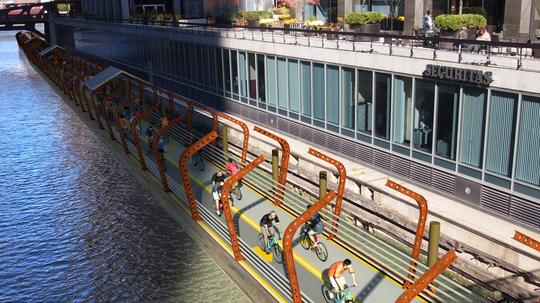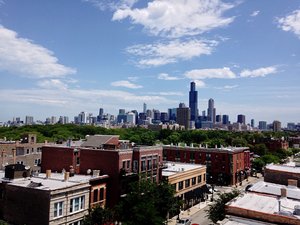
A group of local architects and designers has a solution that could connect disjointed parts of Chicago's bike infrastructure without getting in the way of existing roadways: A floating bike path on the Chicago River.
Chicago architecture firm Second Shore has proposed RiverRide, a series of floating, solar-powered paths that could expand bike lanes through the city without adding more lanes to roads. They hope the solution could make Chicago a more bike-friendly city, as well as revitalize the under-utilized Chicago riverways.
The RiverRide paths would be made up of 82-foot-long, 12-foot-wide, steel-reinforced concrete pontoon segments (secured with pilings driven into the riverbed), developed by Marinetek, a floating structures manufacturer. The paths would also be outfitted with precipitation-activated awnings (so bikers can ride in the rain) and solar-powered lighting (so the paths could be used 24/7).
RiverRide wouldn't be a straight path, but rather a series of segments that connect bike paths from Ping Tom Park in Chinatown to Horner Park in Ravenswood. Second Shore estimates the cost at $5 million to $10 million per mile. 6.5 miles of the segments would cost about $84 million (for comparison, the 2.7 mile-long 606 trail on the west side cost $94 million).
Floating roadways aren't necessarily a new concept: Seattle has floating highways, and Portland and Philadelphia have floating paths for bikes. In fact, Second Shore designers James Chuck and Maja Brucic previously worked on a proposal for floating roadways in Croatia.
But floating bike lanes could work particularly well in Chicago, Chuck said, because of the unique geography and declining commercial use of the Chicago River.
"The river runs through so many neighborhoods north and south which developed around the river when it was the main commercial artery through the city," he told Chicago Inno over email. "The level of commercial traffic on the river has declined significantly over the past 50 years as business opt for truck and train and Chicago’s economy evolved from manufacturing to service. Chicago’s economic activity is highly centralized in the central business district, which is served by all three branches of the river, and means that people need to get to/from it nearly everyday."
He pointed out that Chicago's bike ridership numbers have grown quickly, which has also contributed to congestion, conflicts and accidents between bikers and drivers.
Manufacturing could be done on the Port of Chicago in the 10th ward (on the southeast side of the city), then floated north, bringing jobs to the south side, he added.

Second Shore has been working on the proposal since 2012, but recently presented their project to the 33rd Ward Transportation Action Committee (as reported by DNAinfo). RiverRide would be managed and owned by the Chicago Department of Transportation (CDOT), so Chuck said next steps are to ensure the support of city officials who could make the project a priority. Pending approval from the city, they hope to install pilot projects in spring and summer of 2018 on the north and south sides, with a potential full implementation by summer 2019.
Big ideas for changing Chicago's infrastructure have been in no short supply: Recently designers and architects have proposed everything from aerial gondolas to civic-minded police stations to a floating party island on the lake. It isn't clear yet which (if any) will come to fruition, but as famed Chicago architect Daniel Burnham said, "Make no little plans."

Note: Updated with additional details on project.








